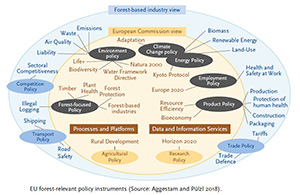

Call to Arms of the European Forestry Sector
April 2020. The European Forest Institute (EFI) is supporting a call to arms of the forestry sector to play an increased role in EU policy. Forests and forest-relevant policies in Europe face a wide array of challenges in a rapidly changing world. Issues such as Brexit, the new European Parliament and European Commission, and the recent European Green Deal proposal are certain to affect policymaking, as are the as-yet unknown impacts of the coronavirus (COVID-19). Many of the forest-relevant policies currently in place have been targeted towards 2020, and while a final evaluation of their achievements is not yet possible, a look into the future is essential. In the science policy study the authors from Austria, Germany, Italy, Netherlands, Sweden, the UK, and EFI set the agenda and describe five policy implications:
«Europe and the EU will face a significant new era of forest policymaking after 2020. A strategic and co-ordinated policy direction will be required, not least to support the implementation of globally agreed policy targets such as the Sustainable Development Goals, the Paris Climate Agreement and Convention on Biological Diversity. In the global policy arena, trade developments related e.g. to China, Russia and North America will also have important implications for the European forest sector. On a pan-European scale, a decision on whether to start negotiations on a legally binding agreement on forests in Europe un¬der the umbrella of the United Nations Economic Commission for Europe (UNECE) will have to be tak¬en in 2020.
Policy Implication 1: Increase EU forest policy coordination between EU and Member States (verti¬cal integration) and of separate EU policy objec¬tives (horizontal integration). Future interaction between pub¬lic (government) and private initiatives forms a third mode.
Policy Implication 2: Forest sector should increase cross-sectoral policy initiatives and become a strategic player.
Policy Implication 3: With regard to the introduction of new instruments and practices in forestry policy: Policy integration is typically incremental and path-dependent.
Policy Implication 4: forest sector and its product markets differ from the heavily subsidised EU agricultural mar¬kets, and might require fewer resources
Policy Implication 5: policymaking on and across all levels of governance requires better inter- and intra-govern¬mental coordination (e.g. between forestry and na¬ture authorities).” European Forest Institute
Reference/s
Wolfslehner B, Pülzl H, Kleinschmit D, Aggestam F, Winkel G, Candel J, Eckerberg K, Feindt P, McDermott C, Secco L, Sotirov M, Lackner M, Roux JL (2020): European forest governance post-2020.
Disclaimer: You agree that B2Bioworld is not responsible and will not be held liable for any third party content on its sites or any third-party content, products or services available on other web sites accessed through links from B2Bioworld sites. Links to third-party sites are for your convenience only, and their inclusion on B2Bioworld\'s sites does not imply any endorsement, guarantee, warranty or representation by B2Bioworld.
Other articles recommended
B2Bioworld offers you background information
Accessing Biomass in Russia
What is possible hosting an outpost of the German chemicals industry?
Prospects of Enzyme Engineering and Biofuels Markets in Russia
Vladimir O. Popov, Director Bach Institute of Biochemistry, Moscow and EU liason person
Bioeconomy offers Europe and Russia opportunity for long-term strategic cooperation
Open letter by Esko Aho, Marc Palahí, and Göran Persson - open access